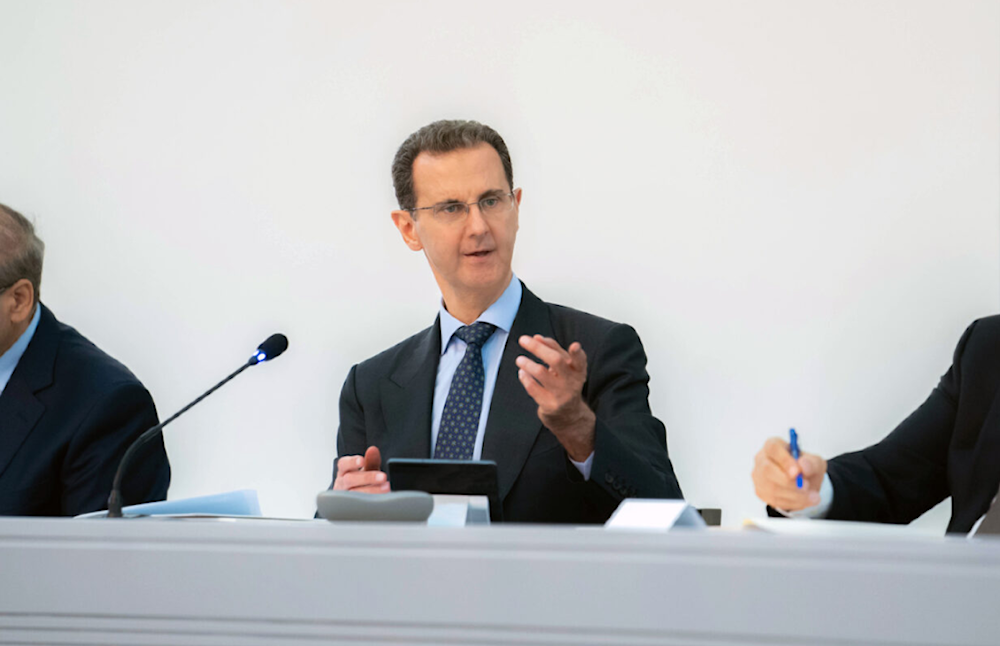US-made chaos behind increased instability in the world: Al-Assad
The Syrian president affirms the principles of Syrian foreign policy in its relations with its Arab and regional surroundings.
-

Syrian President Bashar al-Assad during an open dialogue with ambassadors, chiefs of diplomatic missions, and officials of the Foreign Ministry (SANA)
Syrian President Bashar al-Assad reiterated the Syrian foreign policy's key principles on Thursday, underlining the country's approach to Arab and regional ties, as well as international contacts and challenges, which are guided by a strategic and practical vision.
In an open dialogue with ambassadors, chiefs of diplomatic missions, officials of the Ministry of Foreign Affairs, and expatriates, the Syrian president affirmed that "bilateral relations are the nucleus for boosting relations with Arab countries."
Al-Assad tackled current political difficulties using the logic of solid principles, on the one hand, while confronting regional and international challenges, on the other.
Furthermore, he expressed that Operation Al-Aqsa Flood should be viewed within the context of the Palestinian cause, rather than as an urgent event, in response to the United States and its Western allies' attempts to demonstrate that October 7 is the source of the problem.
President al-Assad went on to say that dealing with the difficulties and challenges facing Syria now is linked to the country's geographical and historical position, as well as its status as a battlefield and the target of imperialist ambitions throughout history.
He underlined how "chaos" caused by the United States has increased global instability and that the current international conflict is an economic-technological one, especially as the West has begun to lose technological control over the East, hastening the formation of a new multipolar world.
The future belongs to the Orient
The president stated that "the future belongs to the East now, because it was able to preserve its identity and principles" and that subsequent developments confirm the escalation and continuation of this conflict, which will cause more crises for all countries and peoples around the world.
The discussion also covered the institutional side of diplomatic work, with al-Assad emphasizing that this process is closely linked to the overall development of government sectors and highlighting the need to enhance work rules, as well as communication and coordination mechanisms between the Ministry and its missions abroad.
President al-Assad made these remarks at the conclusion of a regular meeting with ambassadors and heads of Syrian diplomatic missions held at the Ministry of Foreign Affairs and Expatriates over the past several days.
'We must discuss our policies': Al-Assad to Syria's Assembly
In a speech before the People's Assembly on the occasion of the opening of the fourth legislative term on Sunday, President Bashar Al-Assad stated that the People's Assembly is the most crucial institution within the state, but its impact will not be significant unless development is comprehensive across all institutions, considering the strong relationship between them.
"Dear members of the People's Assembly, I congratulate you on the start of the work of the fourth legislative term and you have gained the trust of your voters to be honored to serve them. Let us remember at the beginning that public trust is a resource that quickly depletes if it is not nourished by hard work," al-Assad said.
Al-Assad noted that immunity does not mean breaking the law; instead, it requires MPs to lead by example in upholding and adhering to the laws they are responsible for enacting.
"The role of the People's Assembly is to ask about the tools when it approves a law, approves a policy, etc., and when it does not ask about how to implement it, it bears responsibility for the negligence with the executive authority," the president said.
Institutions will be supported, but officials will be held accountable, al-Assad added, stressing that responsibility comes before authority for both.
"You bear the responsibility of discussing visions, based on your possession of visions, and this requires a clear methodology that prevents individual work at the expense of the institutional one," the president went on to say.
Moreover, individual actions, even if correct, would be ineffective, he said, adding, "We must start from policies and visions in our relationship with the executive authority."

 4 Min Read
4 Min Read








